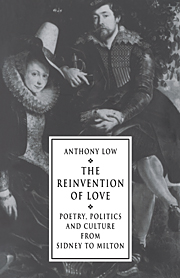Book contents
- Frontmatter
- Contents
- Preface
- Introduction
- 1 Sir Philip Sidney: “huge desyre”
- 2 John Donne: “Defects of lonelinesse”
- 3 John Donne: “the Holy Ghost is amorous in his Metaphors”
- 4 George Herbert: “the best love”
- 5 Richard Crashaw: “love's delicious Fire”
- 6 Thomas Carew: “fresh invention”
- 7 John Milton: “Because wee freely love”
- 8 John Milton: “Haile wedded Love”
- Conclusion
- Notes
- Index
7 - John Milton: “Because wee freely love”
Published online by Cambridge University Press: 02 October 2009
- Frontmatter
- Contents
- Preface
- Introduction
- 1 Sir Philip Sidney: “huge desyre”
- 2 John Donne: “Defects of lonelinesse”
- 3 John Donne: “the Holy Ghost is amorous in his Metaphors”
- 4 George Herbert: “the best love”
- 5 Richard Crashaw: “love's delicious Fire”
- 6 Thomas Carew: “fresh invention”
- 7 John Milton: “Because wee freely love”
- 8 John Milton: “Haile wedded Love”
- Conclusion
- Notes
- Index
Summary
Throughout much of the modern period, from the late nineteenth century until past the middle of the twentieth century, Milton suffered a series of attacks from famous critics and was generally out of favor. The story is familiar. Yet, even though we may have grown tired of hearing it, it still has a lesson to teach us. Although the attack was on multiple grounds, both substantive and stylistic, one may conclude that religion and politics had much to do with stimulating it. When Sir Walter Raleigh proclaimed that Paradise Lost was a monument to dead ideas, he meant that there could be no serious place for Christianity in the modern world. When Ezra Pound assailed Milton mainly on stylistic grounds, he revealed similar motives at the point where he excoriated him for “his asinine bigotry, his beastly hebraism.” Milton was not a Jew, but for many critics, of whom Pound was only among the frankest, his particular brand of Christianity was imbued with a disturbing zeal, which they associated with Matthew Arnold's category of “Hebraism,” and which they found less attractive than Arnold's more rational and balanced category of “Hellenism.”
T. S. Eliot had very complicated reasons for attacking Milton, among them a desire to clear the ground for a new kind of modern poetry, but surely another important reason was his lack of sympathy for Milton's particular brand of revolutionary politics and enthusiastically non-conformist religion.
- Type
- Chapter
- Information
- The Reinvention of LovePoetry, Politics and Culture from Sidney to Milton, pp. 158 - 177Publisher: Cambridge University PressPrint publication year: 1993



